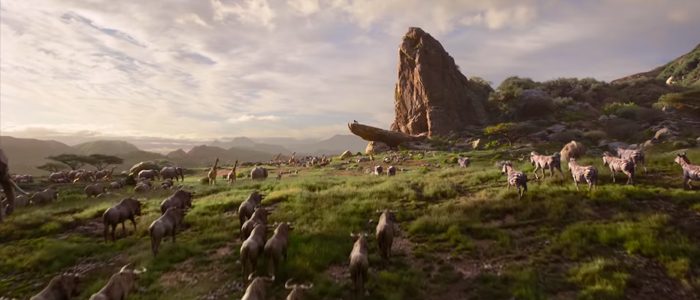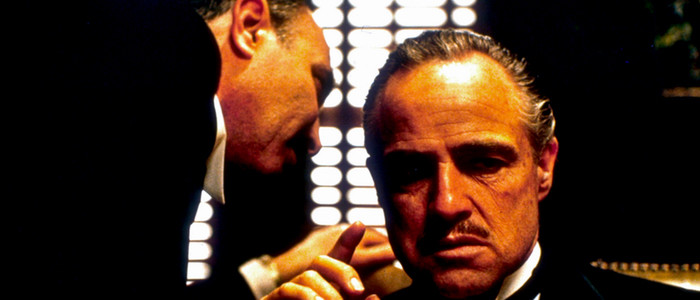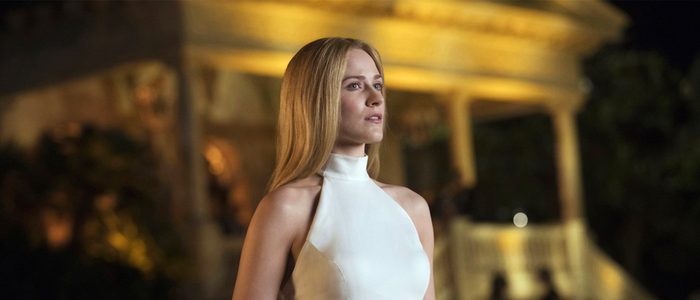How The Technology Used to Make Jon Favreau’s ‘The Lion King’ Could Change Entertainment As We Know It

Back in 2017, I caught a glimpse of the future.
During a visit to the set of Jon Favreau’s The Lion King, we got a look at the technology the director and his team used to create the film’s locations in virtual reality. Using a video game engine called Unity, all of the movie’s sets were built as explorable environments that can be visited and scouted by simply donning a virtual reality headset. You can be standing in a sound stage in Playa Vista, California at 9am, and then, five seconds later, be looking around the African plains as the sun sets in the distance.
During our set visit interviews, some of The Lion King’s primary crew members shared their observations and insights about what other kinds of movies could be made with this technology and how it might change the way we think about entertainment moving forward. Remaking classic films is just the beginning – this could be a stepping stone to an entirely new form of experiential entertainment.

What Other Kinds of Movies This Technology Allows You To Make
Rob Legato, the Oscar-winning visual effects supervisor who worked on James Cameron’s Avatar and previously collaborated with Favreau on The Jungle Book, says that this Unity/VR workflow could result in filmmakers doing the unthinkable: remaking classic movies that were previously thought to be untouchable.
“You can make The Godfather again. You could make a David Lean movie again and not look like a Marvel movie extravaganza that you don’t believe it. It’s cool and all that stuff and I’m a sort of a purist about it – when you see David Lean films, there’s something about Bridge on the River Kwai, something about Lawrence of Arabia, something about the frame and the discipline and the art of it that [showing] 5,000 people having a battle doesn’t really give me. It feels artificial. It feels like there’s no soul to it…CG has like a bad connotation when somebody talks about it because it’s like, ‘Well, I don’t want my movie to look like CG.’ … If it doesn’t look like CG and you could create that and have the discipline to not make it perfect, you could make any film realistically.”
The idea of purposefully not making a shot look perfect was one that Favreau also focused on during our conversation with him, and it’s clear these guys were chasing a visual style that approximates realism by incorporating human error into the equation in slight, almost imperceptible ways. In other words, technological advancements can make things look too good – so much so that it sets off internal alarm bells to audiences that we’re not actually seeing something real. By having the discipline to override that desire for perfection, it can restore a human touch to a project…even one filmed entirely in a virtual world.
Legato went on to describe some more practical applications of adopting the Unity/VR technology.
“With the actors, you only have them for two weeks. If you have an actor for two weeks and you really want them to be in your movie and half the time is taken traveling from one location to another just to get them in the location that you like or do it artificially on blue screen, you won’t do it. But now you could. Now you can have an actor play a younger person and it’s starting to become easier and easier to do all those things. There’s a thing called Hollow Capture now. Instead of doing a motion capture thing, have somebody in a stage much like ours and photograph them from all angles. Light them the way you like them, and now they’re in the computer. Now you can put any camera move you want and you can put them into a realistic-looking background. So all of a sudden you can make films that – you need the scope of it, the reason of doing it – but the ease of operations of doing it, that could put somebody on the same day they could be in Paris and the same day they could be in New York and the same day could be in Hong Kong. They could be anywhere to help me tell my story, and you don’t give it away.
“And my viewpoint is, it’s not a visual effect anymore if it’s just moviemaking. If you just look at it and you don’t pay attention to it or you don’t go, ‘God, what great visual effects,’ it’s like, ‘Well, it’s just a movie.’ I mean, you don’t say that about The Godfather when you see it. ‘Whoa, great costumes, great sets, interesting light.’ You just watch the film. So you don’t really pick apart one of the disciplines, you just enjoy it. And what we’re hoping to do in this movie that we started on Jungle Book is, why is it even called a visual effect if you just watch the movie and it looks like a movie? It’s no less artificial than any other discipline that we make. We don’t re-create something real life or that’s authentic – it’s movie authentic. It’s cinema, you know? We stage people in a way that makes it interesting for that particular camera. We’re not really capturing real life, we’re capturing movie life. Costumes are made that way. Sets are made that way. It’s no less artificial than any of those other disciplines because we’re making the same thing.”

How This Technology Could Change The Game With Artificial Intelligence
We also spoke with Ben Grossmann, the virtual production supervisor who managed the virtual reality aspects of The Lion King shoot. (He previously won an Oscar for visual effects on Martin Scorsese’s Hugo.) Grossmann tapped into something I used to wonder about all the time when I was a kid: what is my favorite movie character doing when they’re not on screen? If his prediction comes true, we might be able to find out one day.
“What normally happens is filmmakers make a movie and then later, at the end, somebody thinks about making a VR experience or a game or all that stuff,” he said. “But by then the filmmakers are usually exhausted, and the visual effects crews are tired, and everyone’s kind of broken and they just want to get the movie out. In this case, we’re doing all of that before the movie really kicks in, and so the filmmakers have been in virtual reality the entire time. In a sense, one could argue that the film is just an edited down, truncated, and enclosed view of the story.
“But inside that world, there are many other stories that could be discovered. You could say, ‘What happened when Timon was off screen, when I didn’t see him in the movie? What was he up to?’ Or, ‘What was Nala doing before she had to do that scene?’ There may be whole stories there, and traditionally, filmmakers would just make another story like that. They’d film a little television episode or something or a behind the scenes or a vignette. But in the real world, we don’t all stop living just because the camera isn’t turned on, and sometimes the camera, because it’s not turned on, misses a great moment.”
Maybe you’re starting to see how all of this could be a very big deal. It’s not just the idea of putting on a headset to explore a set in virtual reality. The implications of this technology could easily lead to a real-life Westworld scenario, or maybe even something not yet fathomed in the realm of science fiction. But while we are still probably years away from understanding the limits of this technology, its immediate practical implementations may unlock a totally new form of entertainment. Grossman explains:
“What filmmaking in the future can be like is not filmmaking or storytelling, but world building. You create a world where characters have personalities and they have motivations to do different things, and then essentially, you can throw them all out there like a simulation and then you can put real people in there and see what happens. And so as we start to design characters that are controlled by artificial intelligence or in pre-scripted narratives that we tell it, then you could start creating an experience for audiences that goes far beyond sitting in a movie theatre and watching a film.
“And in a sense, Lion King, Avatar, and a lot of these new techniques are laying the foundation for that, because they’re helping build worlds so that you could shoot movies in them – but then what you could do next is open to interpretation. One could argue that there would be a completely new style of filmmaking or storytelling or experience-sharing that could evolve out of this foundation.”
The Lion King is in theaters right now.
The post How The Technology Used to Make Jon Favreau’s ‘The Lion King’ Could Change Entertainment As We Know It appeared first on /Film.
from /Film https://ift.tt/2MnfduL
via IFTTT
Comments
Post a Comment